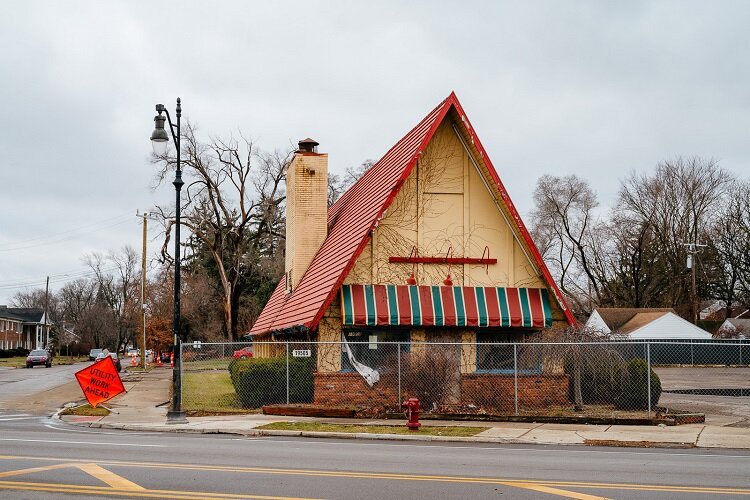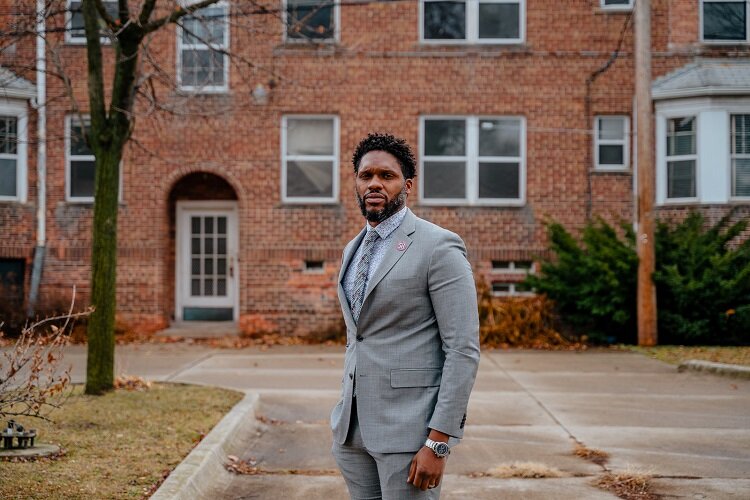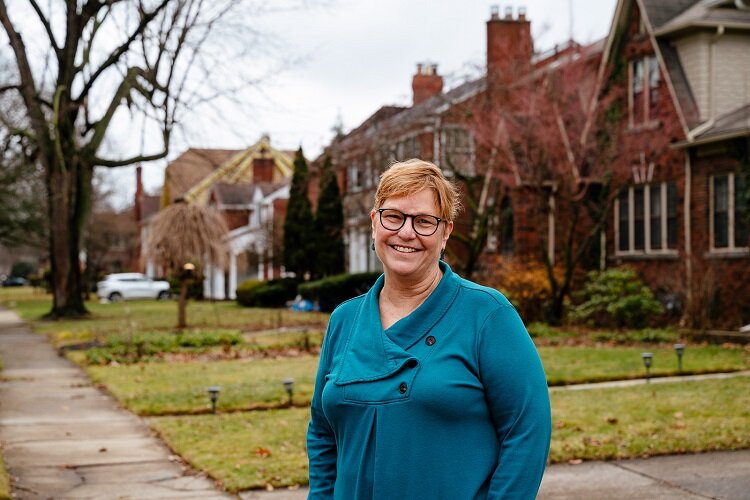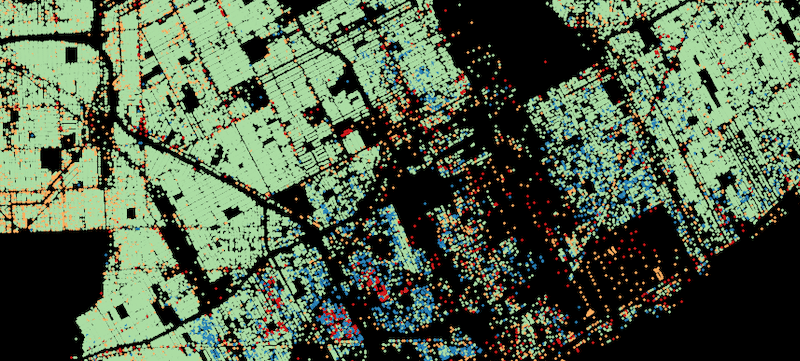These two Detroit nonprofits are prioritizing community engagement in their development efforts
To be effective, community development organizations must work together residents to revitalize neighborhoods. Here are two Detroit nonprofits who want residents to lead the way with their development projects.
Bernadette Atuahene is a frequent visitor to The Commons, a coffeehouse, laundromat, and community space that can be found on Detroit’s East Side, not far from her home.
The law professor, author, and community organizer meets there regularly as a member of the Coalition For Property Tax Justice, an alliance of grassroots groups she helped convene that’s dedicated to helping residents deal with issues related to overvalued tax assessments.
On the first Saturday of each month, attendees get together for an event called Coffee & Stories. Participants listen to guest speakers, gather in a circle to share personal stories which may include grappling with foreclosure, and strategize on solutions. The event also gives them an opportunity to speak with elected representatives and access homeowner-related resources.
“It’s just an invaluable space,” she says. “It’s a laundry and coffee shop. And the meeting space upstairs is a really great idea. It’s really powerful for events like Coffee & Stories.”
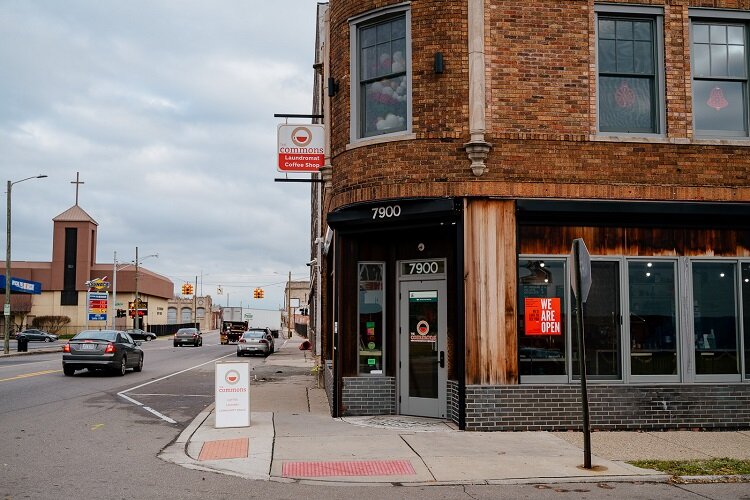
What collaborative development looks like
The Commons was developed by a faith-based nonprofit called MACC Development, which also happens to be a member of the Coalition For Property Tax Justice. Founded by the Mack Avenue Community Church in 2010, MACC Development is what’s known as a community development organization. These types of nonprofit organizations work to provide services and other resources that encourage and support community development.
Antoine Jackson, executive director of MACC Development, feels it’s important for organizations like his to work hand-in-hand with community members.
“CDOs work to revitalize communities in partnership with the neighborhood,” he says. “We’re not coming in with a prescriptive plan. We’re really coming in to work collaboratively with both businesses and residents to make sure we are addressing the issues and needs of the community.”
As is typical for CDOs in Detroit, MACC Development has its own designated service area, which covers the 48214 Zip Code. The nonprofit offers a variety of
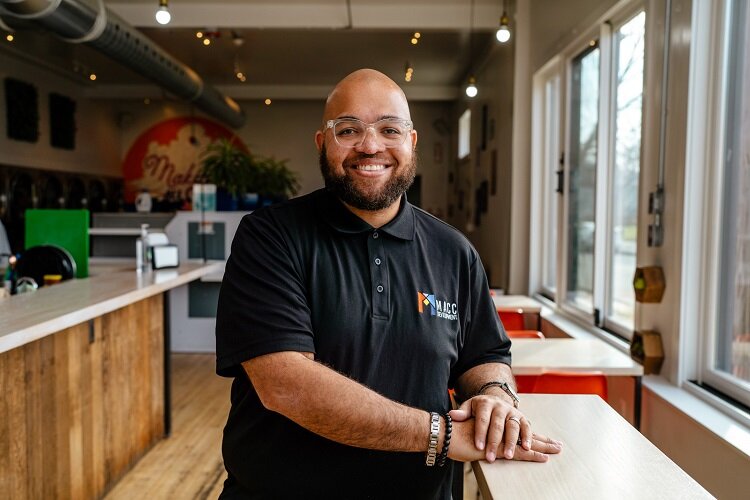
programming to the community, including youth sports, tutoring, summer camp, legal services, and ministry-related trips. It also helped launch the 48214 CARE mutual aid platform to meet resident needs during the COVID pandemic.
Beyond that work, however, MACC Development is also — as its name suggests — a development organization. Located at 7900 Mack Avenue, the Commons is certainly the nonprofit’s most prominent development project. As with the nonprofit’s other development efforts, community engagement has played a key role in shaping how the building would end up being used.
MACC Development purchased the 12,000-square-foot former furniture factory at the corner of Mack Avenue and Beals Street that would become The Commons through the Wayne County tax auction. It began reaching out to local stakeholders about how to use the space around 2014.
As the nonprofit began to look into potential uses for the space, organizers wanted to ensure resident voices were included in its development. So in 2014 MACC Development launched a multi-year process that involved talking to community members that included knocking on doors, canvassing, and hosting community meetings in the space to gather feedback.
“Residents wanted a space where they could come and grab a sandwich or a latte, but they also needed a space where they could be able to do their laundry that was safe, clean, and inviting,” says Jackson. We also knew residents, block clubs, and neighborhood associations wanted a space where they could have a town hall or session with someone downtown, so we have a common space on the second level of our building.”
Renovations of the building began in 2016, and The Commons celebrated its grand opening two years later. Since that time, the space has become a popular destination with residents in the area.
Brenda Butler is a resident of Detroit’s Chandler Park neighborhood and is actively engaged in community work on the East Side as a stakeholder with Eastside Community Network and co-chair of the Lower East Side Action Plan (LEAP) planning effort. She was also involved in MACC Development’s community engagement for The Commons and feels the nonprofit is doing a “top-notch job” of involving community members in its development efforts.
“I was very pleased with the interactions with the community members and the neighbors in suggesting the things that they liked,” she says. “As of today, I still enjoy visiting, being a part of, and volunteering for some of their events. And I do my laundry there occasionally. It’s a great entity for that community.”
The nonprofit’s development work also extends to larger-scale initiatives. Right now, MACC Development is focused on two big community planning endeavors.
The Mack Avenue Strong Neighborhoods Plan is focused on housing
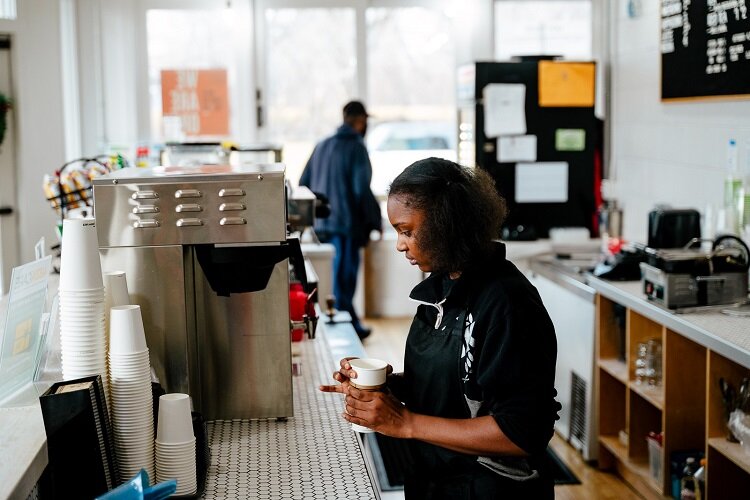
improvements. It seeks to establish a community-led vision and strategic framework to strengthen residential housing in a group of neighborhoods north of Mack, south of Warren, between Grand Boulevard and Fischer Street. Several community meetings have been held so far for the plan, and stakeholders have identified rehabbing vacant homes, improving neighborhood retail and services, and fixing up lighting and sidewalks in the area as priorities.
In addition to that, the nonprofit has also been working on the Mack Avenue Corridor Plan, which will coordinate efforts to revitalize a 13-block stretch of Mack Avenue between East Grand Boulevard and Fischer Street. Spearheaded by MACC development, the project planning was conducted with the assistance of the urban design firm City Form Detroit with additional market analysis and business opportunity recommendations from the University of Michigan Ross School of Business Detroit Impact Team.
The engagement process for the corridor plan involved community meetings as well as individual stakeholder meetings and involved local residents, business and property owners, churches, community groups, the City of Detroit, and other CDOs like GenesisHOPE CDC and The Villages CDC. Some of the top priorities that emerged in the plan, which was published in 2016, include restaurants and grocery stores at a walkable distance, family entertainment, and fitness spaces, a computer learning center, connected green spaces, a library, an entrepreneur resource center and improved safety and retail options.
While MACC Development has taken a lead role in helping create the corridor plan, it doesn’t intend to make all these changes itself. Rather it sees the corridor revitalization as a joint venture that will involve the collaboration of a variety of partners.
“As a small community development organization, we understand that partnership is going to be the best route for us to take in doing development. We have a few different projects that we can’t necessarily talk about openly at this point, but they are in the hopper, as we’re looking at how to best create opportunity along the corridor.”
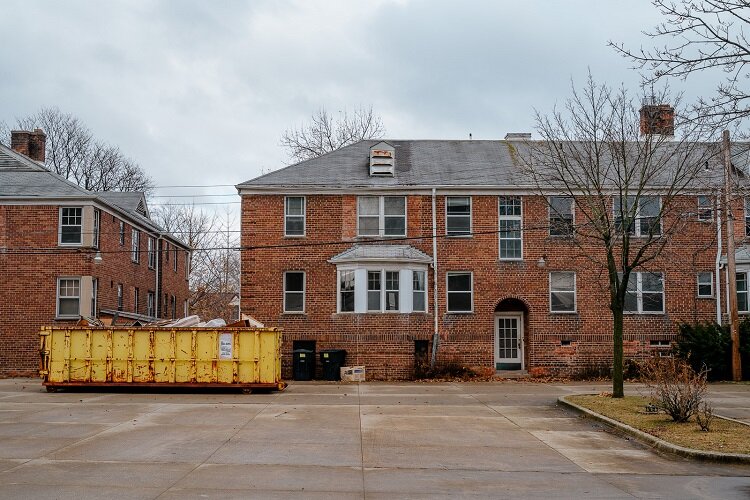
A community-first approach
MACC Development is far from the only organization to make use of community engagement in its development work. In fact, seeking resident input on developments is a fairly common practice in the City of Detroit, especially when it comes to community development organizations. But the extent that different developers go to reach out to local stakeholders can vary quite a bit.
Grandmont Rosedale Development Corporation (GRDC) is another CDO that has a reputation for prioritizing community voices in its development work.
Founded in 1989, GRDC provides a range of resources to five communities in Northwest Detroit that are collectively referred to as Grandmont Rosedale. GRDC
offers a lot of different services to local community members, including home renovation assistance, neighborhood beautification, vacant properties, and code enforcement support, a public safety initiative, and running a farmers market and a co-working facility/business incubator.
Historically, the organization has also focused on acquiring and renovating houses in the community, rehabbing more than 120 over the course of its existence. In the last few years, it’s also taken on a few bigger projects.
One is a multifamily apartment complex at 9710-9730 West Outer Drive in the city’s historic Rosedale Park neighborhood. When completed, the West Outer Drive Apartments will feature 35 units of affordable housing at 60 percent area median income (AMI). The other is a mixed-use development on the grounds of a former IHOP restaurant at 19505 Grand River Avenue. The facility will eventually be home to 42 one-and-two-bedroom affordable senior apartments. It will also feature 5,400 square feet of commercial space.
“The community engagement for those large scale projects are very very critical to make sure that we are responding to the needs of the community and the residents as opposed to just kind of going our own way and thinking that we have the best solutions.”
Resident involvement is quite natural for GRDC, as the organization is built upon a series of block clubs and neighborhood groups. Community engagement for these projects has involved reaching out to these local community groups to inform them about what’s going on and then scheduling virtual or in-person meetings to have community conversations about them. In the case of the West Outer Drive
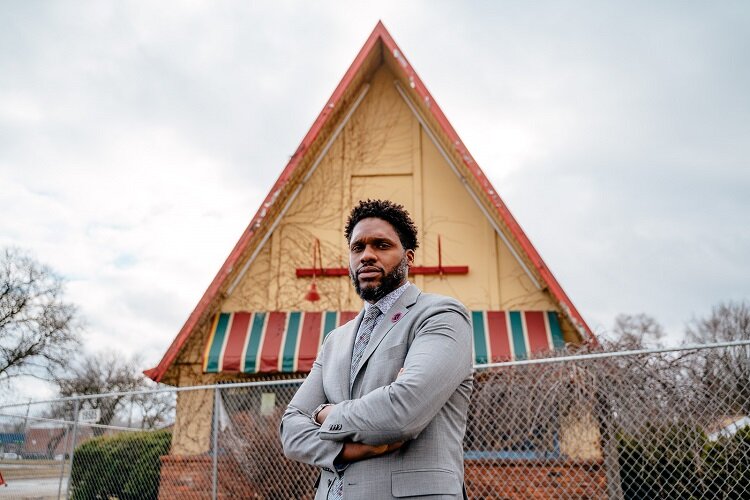
Apartments, GRDC even sponsored tours of the premises so residents could get a better feeling for the facility.
Community engagement meetings around the apartments and mixed-use space gave GRDC an opportunity to answer questions about the spaces and the possibility of using Low-Income Housing Tax Credits (LIHTC) to make them affordable.
During these conversations it became apparent there was a strong interest in creating senior housing, so older residents who were interested in selling their homes could stay in the community. Residents also indicated a strong desire to have a sit-down restaurant in the neighborhood. Community engagement also allowed the nonprofit to get input about the type of restaurant community members would like to see and what sort of amenities the senior housing facility should provide. :
Kiki Louya, a Rosedale Park resident, entrepreneur, and former GRDC economic development manager who was involved with setting up some of the early community meetings. For her, the importance of gathering this type of data can’t be understated.
“We can make a lot of assumptions,” she says. “But I think when it comes to urban planning and development in general, that’s actually something you shouldn’t do, just make assumptions about the community you are trying to serve.”
Michelle Fecteau is a North Rosedale Park resident, who serves as the captain of her local block club and was active with a community advisory committee connected to the Grand River mixed-use space. Although some residents raised concerns during community engagement sessions, she believes raising them during planning meetings for the project helped to rally community members’ support for the project.
“Issues came up about traffic, how it would affect the block community,” she says.”But because there was a forum for them to surface and be addressed. I think most people felt very good and had their questions answered effectively.”
GRDC’s planning efforts have involved combining market research and analysis with this community engagement work. For the Grand River mixed-use space, that work continues. The nonprofit is still searching for long-term commercial tenants and programming at the space that they feel will be a good match for local stakeholders.
As they move forward, Randall is certain that GRDC’s approach is the right one for the Grandmont Rosedale community, and a sensible path for other developers looking to break ground on projects that will resonate with neighborhood residents
“The best community engagement is resident-led,” he says. “Listen first, before you speak, and then try to dovetail your strategy with the community. That’s where success happens with community engagement.”
All photos by Nick Hagen.
This is part of the Block by Block series, supported by FHLBank Indianapolis, that follows minority-driven development in Detroit.
